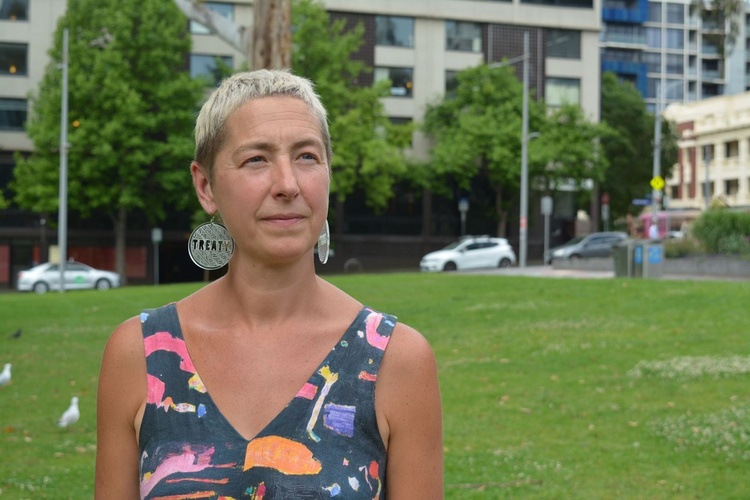As a young child, she encountered situations that most people will never come across in their lifetimes, including being smuggled across the border to Soviet-occupied Afghanistan in the back of an ambulance while it was still a perilous war zone.
Those formative years in a foreign land marked the beginning of an incredible journey, which has led her to her current role as the director of advocacy and campaigns at the Asylum Seeker Resource Centre (ASRC), Australia’s largest human rights organisation providing support to people seeking asylum.
Favero inherited a passion for social justice from her father, Raffaele Favero, an Italian journalist who was killed in Afghanistan in 1983 while filming a documentary to expose the atrocities unfolding during the Soviet invasion.
Both of Favero’s parents had an affinity with the region and its people, with Raffaele even changing his name to “Rafiullah” and converting to Islam.
The couple’s special bond with the land is evident in their first daughter’s name, as jana is a Pakistani term of endearment meaning “my love”.
“My father was born in Valsolda, Lombardy; he studied architecture at university in Milan and then went travelling,” Favero says.
“He was a roaming hippie, a dreamer and an avid drawer.
“He met my Australian mother [Jill Favero] while they were both travelling in Pakistan in the early ‘70s.
“They fell in love and got married in Milan.”
The couple then moved to Australia and started a family on a farm on the outskirts of Stawell, a former gold mining town near the Grampians.
When Favero was a toddler, the family moved to Maryborough.
“Mum had three kids under the age of four and dad was travelling to Afghanistan a lot to shine a light on what was happening there,” Favero says.
“He went to Afghanistan four times between 1980 and 1983 to film the documentary, staying there for months at a time.”

Jana Favero (centre) with her father Raffaele and younger sister Rhea in 1982
Favero grew up speaking Italian at home and the family maintained strong ties to her father’s birthplace.
“My father was still very much Italian to the point where he became an Australian citizen on April Fools’ Day because he said it didn’t count,” she laughs.
Favero has fond childhood memories of spending time with her family in the kitchen – which she says was the “heartbeat of the household” – or cheering on the Italian national football team.
But one day in October 1983, when Favero was just six years old, her life was turned upside down.
“My father had been in Afghanistan filming and was meant to travel to Bali to meet us for a family holiday,” she recounts.
“He was killed on his last day in Afghanistan; his death was caught on camera because he was filming a captured Russian tank when it hit him.
“We were already in Bali and Australian Embassy officials came to our door to tell us that he’d died.”
Following Raffaele’s death, Favero’s mother travelled to Afghanistan with three young children in tow in a bid to recover her husband’s body and finish filming his documentary, Frontline Afghanistan, which went on to win a Logie in Australia and numerous international film festivals.
Favero’s older brother, Adam, was eight years old at the time, and her sister, Rhea, was just three.
The family spent two months in the region, mainly in a refugee camp in Pakistan as Afghanistan was still a war zone.
“I vividly remember my mother dying our hair black so we didn’t scare the other children because the only people they’d seen with blonde hair were Russians,” Favero says.
“I understood from a very young age that people can do terrible things to others for no reason other than how they look, their religion, or their culture.
“That’s stayed with me my whole life and my father’s story ties in very closely with why I do the work that I do.”

Jana Favero (centre) and her siblings Rhea and Adam in the back of an ambulance crossing the border from Pakistan into Afghanistan in 1983
Sadly, Raffaele’s body was never recovered despite his family’s attempts.
Following the passing of her husband, Favero’s mother continued to honour his Italian heritage.
“She was committed to going back to Italy every two years,” Favero says.
“I’m lucky to have such a strong, amazing mother who maintained an essential bond with family and culture across the seas.”
A young Favero also carried on her father’s legacy and his work in social justice.
“There’s footage of me as a 10-year-old asking the then prime minister hopeful, John Howard, what he would do for refugees from Afghanistan if got elected,” she says.
“I was born in Australia and I’m white, so I can speak out without any reprisal; I’ve always felt that I should use my voice where I can because I’m so lucky to have a voice.”
After moving to Melbourne for her university studies, Favero embarked on a career that includes communication roles within the private sector in the UK, working with women to establish social enterprises across the Mongolian steppe, and leading a campaign to increase the effectiveness and acceptance of women as political leaders in India.
During her three-year stint in Mongolia, Favero met and fell in love with her now partner, Ben, who also happened to hail from Melbourne.
The couple returned to Australia before travelling to India together to advocate for women’s political empowerment.
“It was just after the Mumbai attacks, so the law at the time was that every six months we had to leave India and come back on a new visa,” Favero explains.
“After the first six months, we’d planned to come back to Australia for a few weeks and then return to India; but the day before we left, I saw a part-time job in communications at the ASRC.
“I applied and got it and we stayed in Melbourne.
“Twelve years and three kids later, we’re still here!”
In her current role, Favero leads campaigns on policy and law reform and directs advocacy on behalf of people seeking asylum in Australia.
She is a regular spokesperson on human rights and refugee policy and contributes comments to major media outlets, including Fairfax, News Corp, the ABC, The Guardian, The New York Times and Al Jazeera.
“The end goal is the fair and humane treatment of people seeking asylum and refugees,” she says.
“It’s pretty simple: all people should be equal.
“According to the [1951] Refugee Convention, people seeking asylum should be assessed the same way, whether they arrive by boat or by plane.
“If you’re being persecuted by the government of your country, you can’t exactly turn up and ask them for a visa, so people escape however they can.
“But Australia has pretty much ripped up the convention and created this idea that people should come the ‘right way’ – that is, by plane – demonising those who don’t.
“There are refugees who have been in detention for nine years for no other reason than seeking asylum.”
Another important aspect of Favero’s work is ensuring that refugees can safely lead advocacy initiatives, so as to give those at the heart of the issue opportunities to have their voices heard.
“Our parliament is made up predominantly of Anglo men,” she says.
“There needs to be greater representation of our diverse community, including refugees, at a decision-making level.”
One of the biggest challenges of Favero’s work is combating the misrepresentation of people seeking asylum and refugees.
She explains that before the ASRC is in a position to be able to realise its vision, it must invest enormous efforts into dismantling an oppressive system fuelled by misinformation.
“The government and some mainstream media are so successful at manipulating the debate and misrepresenting what’s happening that so much of our time and energy is going towards reshaping that debate,” she says.
“In 12 years, we’ve had so few wins as a refugee movement because we’re starting from behind.”
While her work is a constant uphill battle, Favero refuses to be discouraged and continues to draw strength from every single refugee she has met, starting with the children she played with on Pakistani soil 40 years ago.
“They were kids just like I was, but they were as strong and resilient as the refugees that I’m lucky enough to meet and work with today,” she says.
“Every single story is powerful and inspires me; no one wants to be a refugee but it’s a life lottery and people do whatever they can to get themselves and their families to safety.
“Even just to get to Australia is a story of incredible bravery and resilience.”

Jana Favero (right) and her family in Peshawar, Pakistan, in 1983/4
Spurred on by the courage of those whose voices she hopes to amplify, Favero is optimistic that the tide is changing thanks to growing support from the wider community and increased opportunities for refugees to speak out for their rights.
“People are opening their eyes to the government’s deception and the demonisation of certain groups of people,” she says.
“We’ve seen massive momentum behind calls to remove refugees from detention.
“When I started at the ASRC, it was a million-dollar organisation with 13 staff; it’s now a $20 million-plus organisation with 200 staff.
“On principle we don’t receive any federal government funding; we get a small amount of state funding but we’ve only been able to grow because of the generosity of the community.
“We had 1500 volunteers who were still turning up even during the COVID-19 pandemic.
“People want to see change and that gives me hope.
“But we also need bravery from other leaders – whether it’s politicians, businesspeople or sportspeople – to challenge racism and discrimination, because the way refugees are treated is also the way migrants and First Nations people are treated in Australia.
“It’s all part of the same system so we need to work together to tackle that.”
Favero and her team are currently in talks with the Ukrainian community in Australia to understand how they can assist following Russia’s invasion of Ukraine.
“I’m so saddened by what’s happening in Ukraine: the deaths of innocent people, the cities that have been flattened and the lives that have been devastated by unnecessary force,” she says.
“In times of crisis we want to know what we can do from the people who are directly impacted.”
It is clear from the conviction in Favero’s voice that her admirable work is far from over and her father’s legacy lives on in ways he may never have dreamed of.












